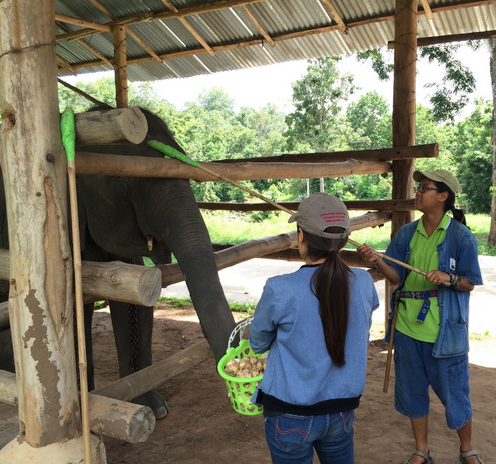![Mahouts at Sappraiwan train elephants using positive, rather than negative, reinforcement. [Andrew Park]](http://www.jstudentboard.com/reporter/wp-content/uploads/2015/10/06.elephunk-300x281.jpg)
Data from various sources verify the brutal fate of elephants, yet the Sappraiwan Elephant Sanctuary in Thailand shows how elephants deserve to be treated. When I visited Sappraiwan for a week, I witnessed the close bond between Mahouts – the elephant keepers – and Thai elephants. After a thoughtful week at the Sanctuary, I realized that a healthy relationship between humans and the feral giants can be attained through mutual respect.
Located in the Wang Thong district of Thailand, a nine hour bus ride from Bangkok International Airport, Sappraiwan Elephant Sanctuary has been home to 12 elephants for more than ten years. Ranging in weight from 1100 pounds to three tons, these mammals rely not only on each other but on the Mahouts, who consider the elephants to be no less than family.
Watching the Mahouts interact with the elephants is similar to watching small children with their parents. The Mahouts feed them, wash them, play with them, examine their health, train their babies, and even scold them when they misbehave. I once saw a Mahout smiling like a proud father when a young elephant first walked home by himself.
However, such healthy relationships are not so common outside of the Sanctuary.
According to the UN’s Food and Agriculture Organization, the historically-acclaimed elephants of Thailand receive minimal protection. Moreover, laws and regulations involving domesticated elephants are ineffective and outdated; the current law, the Beast of Burden Act of 1939, has been in use since the time elephants were still a means of transportation.
According to People for the Ethical Treatment of Animals (PETA), constant and improper transfers of elephants cause these smart and emotional animals great stress as they adjust from one habitat to another. Such factors can cause fatal tragedies, such as the enraged elephant accidents that have become common news items in Thailand.
Naiyanet Koysombat, a veteran Mahout who has studied in Thailand for more than 25 years, told JSR that “misused elephants often cause tremendous damage. A full-grown elephant is extremely hard to control once out of control; most guns used in Thailand can’t even pierce the outer skin.”
According to Koysombat, “We must remember that the only sources of stress for the elephants are caused by humans. Deforestation, improper training, mistreatment, and many more factors eventually hurt the elephants and humans.”
Thai zoo trainers often hurt elephants with extremely tight cuffs used to establish authority. Spike hammers and sharp spears are often used to punish young calves as well. Circus elephants are ordered to stand on two front legs or on small boxes to entertain tourists and locals, tricks that cause distress and can lead to bone disorders. Baby circus elephants are often taken from their mothers, given alcohol or amphetamines, and forced to perform on the streets for money.
Yet the elephants at the Sanctuary seem content.
Koysombat told JSR, “Not a single elephant misbehaved or caused any damage in the past ten years I’ve been here. Sure, a couple male elephants tend to get aggressive during [the mating season] as their testosterone level spikes; but not many teenagers hurt their parents during puberty.”
The Sanctuary demonstrates that domesticated elephants can be mentally and physically healthy when surrounded by loving humans. We should advocate for more humane treatment of these large, intelligent, and sensitive creatures.

